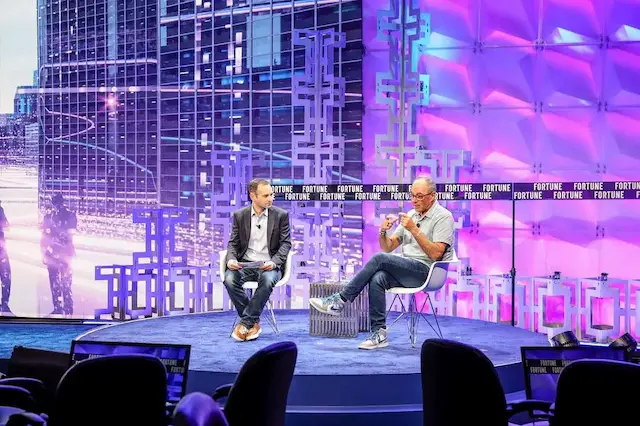物联网:搜索引擎的终结者
在不久的将来,随着物联网技术不断走向成熟,你拥有的所有互联设备,将自动收集你的个人数据,提前洞悉你的需求所在。当然,搜索还在进行,只不过隐身在了幕后。届时,我们就无需访问谷歌的主页——除非你想欣赏一下每天更新的涂鸦作品。
|
智能手机使个人计算发生了革命性变化,创造了一种大多数人全天24小时触手可及的电脑。而物联网将把我们的房屋、车辆、卧室和办公室连接起来并收集数据,从而有望催生下一个计算革命。
仅仅一两年之后,在全球范围内,物联网设备的数量将超过个人电脑、智能手机和笔记本电脑的总数。根据各种不同的预测,到2020年,全球联网设备最少将达410亿台,最多将达800亿台。
但这将如何真正地改变我们的工作和生活方式呢?
搜索引擎已死,搜索行为永存
近些年来,人们一直在说,搜索引擎已死,但我们会发现自己还是在谷歌上找饭店、找最好的滑雪装备或研究一家新公司。但物联网的灿烂前景意味着,大家以后再也不用搜索了。你拥有的所有互联设备,将自动收集更多关于个人信息、习惯、需求和喜好等方面的数据。这些数据累积起来,就会浮现出一个完整的虚拟档案,进而能够提前了解你的需求所在。
实际上,你甚至不必主动询问,物联网就能预测你的需求,在必要的搜索之后,它就会提供你所需的结果。在你感觉太热之前,它就能调整空调,在你注意到纸巾快用完之前,它就能自动订购新纸巾。显然,搜索还会进行,只不过整个过程是在幕后进行。如果物联网真能发展成我们所预期的模样,大家就再也无需访问谷歌的主页了——除非你想欣赏一下每天更新的涂鸦作品。
生态系统就是一切
要想迎来这一发展,我们所有的设备和数据都必须充分互联。到2020年,每个人平均将拥有超过4台物联网设备,但如果它们彼此孤立,就不会发挥什么作用。
就像操作系统已成为移动生态系统的动力基础一样,让物联网设备彼此互联的中央平台也将成为行业基石。这些平台将收集并分析来自各种来源的数据,并与移动支付、商务和其他服务相连,从而使用户能基于这些信息采取行动。一个开放的平台是创建物联网生态系统的关键,这个系统整体比其构成部分更强大。
在公司层面,打造一个强有力的生态系统也是成功的关键所在。物联网的赢家将是那些打造出庞大且忠诚的用户群的企业。就产品而言,更多用户会产生更多数据,这会让算法获得更多信息并输出更好的结果。更大的出货量也会让企业对供应商获得更多优势,并使自己对合作伙伴产生更大的吸引力。正如社交层面一样,网络效应总是至关重要的。
中美将互相依赖
要成为一家成功的物联网企业绝非易事。事实上,物联网企业必须同时具备以下这三类卓越企业的特质:
1、硬件企业:生产配备用于收集数据的高品质传感器的优秀产品。
2、平台企业:收集、处理并分析大量数据,提供有价值的洞见。
3、软件企业:创造一流的用户体验,使数据中获得的洞见可以执行。
一家公司要想同时做好所有这些方面非常困难。而如果拥有全球化视野,公司就能找到最佳解决方案——不管这种方案身在何处。
在我们的投资组合中就有几家这种公司,比如Zepp和EHANG,它们在硅谷和中国都设有总部,这是因为它们知道自己必须在这两个地方都获得成功。在美国,它们能找到经验丰富的产品设计师、工程师、营销专家,并接触到高端消费市场。在中国,它们能获得生产及供应链优势,不同层次的工程师以及一个巨大的发展中消费市场。
全球化运营还能让企业服务于不同的小众市场,或运用案例获得规模效应。尽管客户体验和入市策略可能需要作出调整,以适应不同市场和部门,但后端技术却能在全球范围内应用。我们希望今后有更多物联网(及其他技术类)企业抛开“本土”企业的束缚,从一开始就真正按全球化方式运作。
不只手机具有移动性
苹果智能手表的推出,实际上预示着物联网即将迎来的新一轮进化:硬件、软件和移动终端之间的界线不再清晰。
迄今为止,物联网设备一直是一堆与智能手机应用相连接的硬件,通过手机才能与它们互动。而这款手表标志着一个重大转变,即它把硬件、传感器与软件和用户界面整合到了一个设备中。尽管它仍需要通过iPhone联网,但很容易看出,未来的iWatch将让手机再无容身之地。
随着物联网设备不断升级,它们将具有更多“移动”特性,并成为很多目前我们要靠智能手机才能实现的功能的新平台。除了让搜索过时,在不远的将来,物联网还能让智能手机变得落伍。(财富中文网)
本文作者李宏玮和童世豪为纪源资本管理合伙人。李宏玮常驻上海,童世豪常驻硅谷。 译者:清远
审校:任文科 |
The smartphone revolutionized personal computing, creating a computer that most of us have within arm’s reach 24 hours a day. The Internet of Things promises to revolutionize computing again, by connecting and collecting data from everything we live in, drive in, eat in, sleep in and work in.
In just a year or two, the number of IoT devices will outnumber the number of PCs, smartphones and laptops globally. Forecasts range from as low as 41 billion to as high as 80 billion connected devices worldwide by 2020.
But how will this really change how we live and work?
Search is dead, long live search
For years people have been claiming that search is dead, but we still find ourselves on Google GOOG 1.57% looking for a restaurant, searching for the best ski equipment or researching a new company. However, the promise of Io T means never having to search again. With every connected device you have, more data is collected about you, your habits, your needs and your preferences. When this data is aggregated, a complete virtual profile of you emerges. This profile will will know what you need before you do.
The virtual you will be able to anticipate your needs, perform the necessary search and deliver the result you need, before you even have to ask. It will be able to adjust your thermostat before you realize you are too hot or place an order for tissues before you notice you have run out. Obviously, search still happens, but it is all done behind the scenes. If the Internet of Things becomes what we believe it can be, you’ll never need to visit the Google homepage again – except to check the daily doodle.
It’s all about the ecosystem
For this to happen, all our devices and all our data have to be connected. By 2020, the average person will have more than four Internet-connected devices, but they won’t be very useful if they exist in silos.
Just as operating systems have become the bases of power in the mobile ecosystem, the central platforms through which IoT devices connect will be the locus of the industry. These platforms will enable the aggregation and analysis of data from a variety of sources and will connect to mobile payments, commerce and other services so users can take action based on that information. An open platform is key to creating an IoT ecosystem that is greater than the sum of its parts.
At the company level, building a strong ecosystem is also critical to success. The winners in IoT will be companies that build large, loyal user bases. On the product side, more users create more data, which informs algorithms and delivers better results. Shipping more units also gives companies more leverage with suppliers and makes them more attractive to partners. Just as in the social sector, network effects will matter.
The U.S. and China will need each other
Being a successful IoT company is hard. In fact, IoT companies have to be three great companies in one:
1.Hardware: Building beautiful products with high-quality sensors to collect data.
2.Platform: Collecting, processing and analyzing massive quantities of data to deliver insights.
3.Software: Creating best-in-class user experiences to make insights actionable.
With such requirements, it becomes very difficult for a company to do all things well in one place. A global perspective allows the company to seek out best-in-breed solutions – wherever they may be.
We have several companies in our own investment portfolio, including Zepp and EHANG, that were founded with headquarters in both Silicon Valley and China, because they realized they needed to be in both places to succeed. In the U.S., they get experienced product designers and engineers, marketing experts and access to the high-end consumer market. In China, they have manufacturing and supply chain superiority, a breadth of engineering resources and a massive developing consumer market.
Playing in the global market also allows companies serving niche segments or use cases to still achieve massive scale. While UX and go-to-market strategies may need to adapt to different markets and segments, the back-end technologies can apply globally. We expect to see more IoT (and other tech) companies in the future throw off the limitations of being a “national” company and truly embrace being global from day one.
Mobile won’t always be on mobile
The launch last week of the Apple Watch AAPL 1.24% actually foreshadows another evolution coming in IoT: blurring the lines between hardware, software, and mobile.
IoT devices to date have been pieces of hardware that connect to an app on your smartphone, which allows you to interact with them. The Apple Watch signals an important shift as it combines the hardware and sensors with the software and user interface into one device. While it still requires an iPhone to connect to the Internet, it is easy to see a future “iWatch” that eliminates the need for the phone entirely.
As IoT devices evolve, they will take on more “mobile” qualities and become the new home for many functions we currently rely on our smartphones to perform. In addition to making search obsolete, IoT could make the smartphone irrelevant in the near future.
Jenny Lee and Hans Tung are managing partners with venture capital firm GGV Capital. Lee is based in Shanghai, while Tung is based in Silicon Valley. |











